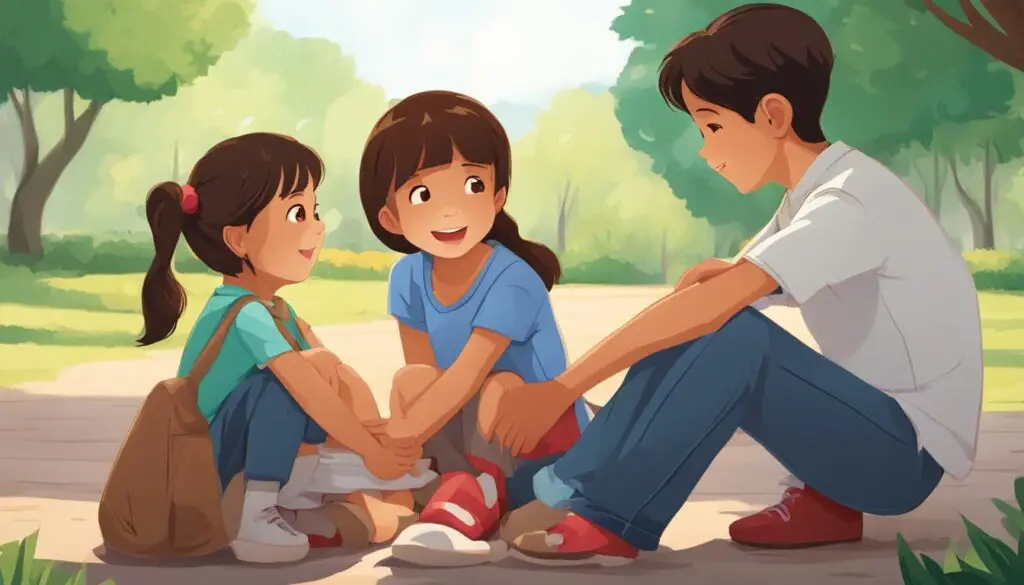
Developing Empathy in Children: A Parental Guide
As a parent, we all want our children to grow up to be kind and compassionate adults. Developing empathy in children is crucial to ensuring they can understand and relate to others’ feelings and experiences.
Empathy is the ability to recognize and connect with other people’s emotions, to put ourselves in their shoes, and to respond to their needs with compassion. Empathy helps children build healthy relationships, communicate effectively, and navigate the complexities of the world around them.
In this comprehensive parental guide, I will provide strategies and activities to help you nurture empathy in your children from an early age. By modeling empathy and practicing it daily, you can help your child develop crucial emotional intelligence skills that they will carry with them throughout their lives.
Key Takeaways:
- Developing empathy in children is essential for their socio-emotional development.
- Empathy helps build healthy relationships, communication skills, and adaptability.
- Parents play a crucial role in fostering empathy in their children.
- Modeling empathy daily can help children develop emotional intelligence skills.
Understanding Empathy and its Benefits for Children
Empathy refers to the ability to understand and share another person’s feelings. It involves putting oneself in someone else’s shoes and experiencing their emotions from their perspective. Empathy is a crucial skill for children to develop because it lays the foundation for relationships and social interactions.
Empathy has numerous benefits for children. First and foremost, it allows them to form deep and meaningful connections with others. Children who are empathetic are more likely to have close friendships and positive relationships with their family members. Additionally, empathy helps children to become better communicators, as they are able to recognize and respond appropriately to others’ emotional cues.
Empathy also promotes prosocial behavior in children. Kids who are empathetic are more likely to engage in acts of kindness and to help others in need. They are also less likely to engage in aggressive or antisocial behaviors, such as bullying or exclusion.
“Empathy is seeing with the eyes of another, listening with the ears of another, and feeling with the heart of another.”
– Alfred Adler
Developing empathy is a gradual and ongoing process that begins in early childhood and continues throughout one’s life. As parents, we play a critical role in nurturing our children’s empathy. In the following section, we will discuss strategies for cultivating empathy in children.
Strategies for Cultivating Empathy in Children
Empathy is a vital skill that can be nurtured and developed in children with the right guidance and approach. Parents play a crucial role in cultivating empathy in their children and can instill this quality through various strategies.
Engage in Cooperative Activities
Encouraging children to participate in cooperative activities by working together with others towards a common goal can promote empathy. Cooperative activities such as board games, team sports or group outings, foster teamwork and create opportunities for children to learn how to work together and support each other.
Discuss Feelings
Starting conversations with children about their feelings, emotions and thoughts, encourages them to express themselves and build their emotional intelligence. Validating and empathizing with their feelings demonstrates that their emotions matter and helps breed understanding of others’ emotions. This, in turn, can help foster empathy and an understanding of how others feel and the impact a child’s actions have on those around them.
Model Empathetic Behaviors
Children learn through observation and mimicry, thus modeling empathetic behaviors allow them to see and understand the importance of it. Parents can demonstrate empathy by showing kindness and compassion towards others, by recognizing when someone is going through a tough time, and helping in any way they can.

“Empathy is seeing with the eyes of another, listening with the ears of another, and feeling with the heart of another.” – Alfred Adler
Teach Problem-Solving Techniques
Parents can teach their children to find creative solutions to problems that incorporate empathy for others. They can teach them to look at things from different perspectives, ask key questions and understand what motivates others to act the way they do. Teaching problem-solving techniques that incorporate empathy helps children become more socially conscious and more effective at working collaboratively to reach mutually beneficial outcomes.
Encourage Altruistic Behaviors
Encouraging altruistic behaviors such as volunteering, donating used clothing or toys to the needy, or simply performing acts of kindness, can instill a sense of empathy and compassion in children. By doing such acts, children learn that others need help and support, and that it feels good to be of service to others.
Cultivating empathy in children is an ongoing and gradual process that requires patience, consistency, and commitment. By following these strategies, parents can help foster an empathetic and compassionate mindset in their children, which will benefit them and their communities for years to come.
Nurturing Empathy in Different Age Groups
Developing empathy in children is a gradual process that evolves over time. Each stage of a child’s life brings unique challenges and opportunities for cultivating compassion and understanding.
The Early Years
Children aged 2-6 years old are in the early stages of empathy development and benefit from activities that promote emotional awareness and expression. Parents can encourage empathy by:
- Reading books that portray different emotions and perspectives
- Practicing active listening and acknowledging their child’s feelings
- Encouraging imaginative play that incorporates different perspectives and emotions

Middle Childhood
Children aged 7-12 years old are developing a more complex understanding of others’ emotions and perspectives. Parents can help cultivate empathy by:
- Fostering empathy for animals and nature through outdoor activities and environmental education
- Encouraging community service and volunteering to promote understanding of diverse groups
- Teaching conflict resolution and problem-solving skills to promote understanding and respect for others
Adolescence
Teens aged 13-18 years old are developing a stronger capacity for empathy but face unique challenges in adolescence, such as peer pressure and a desire for independence. Parents can continue to nurture empathy by:
- Encouraging open communication and active listening to build trust and understanding
- Modeling empathy in their own behavior and relationships
- Encouraging perspective-taking and reflection to promote understanding of different experiences and backgrounds
Conclusion
Developing empathy in children is a critical aspect of their growth and development. It helps them understand and connect with others, fosters kindness and compassion, and promotes positive relationships. As a parent, I believe it is my responsibility to nurture empathy in my child.
Throughout this guide, we have discussed the importance of empathy development and provided strategies for cultivating it in children. By incorporating these techniques, parents can help their children become kind, empathetic individuals who understand and respect others.
Remember, empathy is learned through experience, practice, and guidance. By being a positive role model for our kids, engaging them in discussions, and exposing them to diverse perspectives, we can help them develop empathy and become responsible members of our society.
It is never too early or too late to start developing empathy in children. With patience, consistency, and dedication, we can lay the foundation for a kinder, more empathetic future.
FAQ
Why is developing empathy in children important?
Developing empathy in children is essential because it helps them understand and connect with others on a deeper level. It promotes positive relationships, enhances communication skills, and cultivates a sense of compassion and understanding.
What are the benefits of empathy for children?
Empathy offers numerous benefits for children. It helps them develop better social skills, resolve conflicts peacefully, and navigate diverse relationships. Empathy also fosters emotional intelligence, improves self-esteem, and contributes to building a more empathetic and inclusive society.
How can parents cultivate empathy in their children?
There are several effective strategies parents can use to foster empathy in their children. These include engaging in open and empathetic conversations, encouraging perspective-taking, promoting kindness and generosity, and providing opportunities for volunteer work or community service.
Are there specific activities parents can do to promote empathy?
Yes, there are various activities that can help promote empathy in children. Some examples include reading and discussing books that highlight empathy and compassion, engaging in pretend play that encourages perspective-taking, and participating in community projects or charity events as a family.
How does empathy development vary across different age groups?
Empathy development evolves as children grow. Young children start exhibiting basic forms of empathy, such as comforting others when they’re upset. As they get older, they develop a deeper understanding of others’ emotions and perspectives. It’s important for parents to adapt their approach and provide age-appropriate guidance for nurturing empathy at each stage.
Is it possible to teach empathy to children?
Yes, empathy can be taught and nurtured in children. By providing consistent modeling, guidance, and opportunities for practicing empathy, parents can help their children develop this important skill. Children learn through observation, so it’s crucial for parents to be empathetic role models in their own actions and interactions.